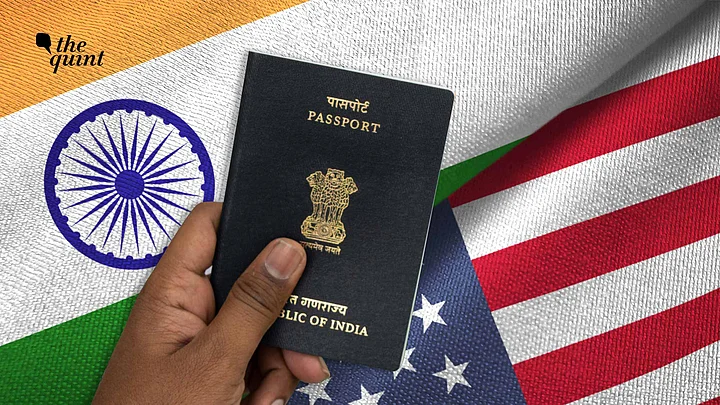Earlier this month, a group of influential United States lawmakers, led by House Immigration and Citizenship Subcommittee Chair Zoe Lofgren, introduced a bill in Congress known as the Jumpstart Our Legal Immigration System Act.
It proposes to reactivate almost 4,00,000 unused family and employment-based visas (about 222,000 unused family-sponsored visas and about 157,000 employment-based visas) to reduce a massive Green Card backlog.
"The Jumpstart our Legal Immigration System Act will help reduce the backlogs, thereby enabling immigrants to fully contribute to their communities and our national economy, while also allowing the US companies to attract and retain high-skilled workers. That will enhance our country's competitive advantage and our position as a global leader in innovation."Zoe Lofgren, House Immigration and Citizenship Subcommittee Chair
According to 2020 report, the backlog for an Indian national to get permanent residency or Green Card is more than 195 years, with recent data from the US State Department recording around four million individuals waiting for a family-sponsored immigrant visa and around one million individuals waiting for a employment-based immigrant visa.
To understand the bill better, The Quint spoke to Naresh M Gehi, the founder and principal attorney at Gehis Immigration & International Legal Services, about what the bill means for Indian immigrants and how it will benefit them, and why the Joe Biden administration is making such overtures to Indians.
What does this bill mean for Indian immigrants eligible for adjustment to Legal Permanent Residence (LPR) status?
This bill will allow the eligible Indian Immigrants to receive work authorisation while waiting for the availability of a visa number. Thus, it will prevent children from running out of their eligible age for the LPR status.
The proposed legislation pertinently allows the immigrants residing in the US to be exempted from the numerical limits of the immigrant visa.
Simultaneously, they can adjust their status to a green card if their immigrant visa petition has been approved for two years with a certain payment of the supplemental fee.
How will it benefit scores of highly skilled Indian IT professionals coming to the US, mainly on the H-1B work visas?
The highly skilled Indian IT professionals who come to the US mainly through the H-1B work visas undoubtedly suffer under the current immigration system since it imposes a 7 percent quota per country on allotment of the popularly aspired Green Card for permanent citizenship.
As mentioned, this legislation will allow the professionals to be awarded an exemption from the immigrant visa numerical limits. They can conveniently adjust their status to a green card provided their immigrant visa petition has been approved for two years in exchange for a supplemental fee.
What exemptions or concessions will directly impact Indian immigrants who have been on waiting lists/backlogs for years?
The exemption from the immigrant visa numerical limits will squarely impact the Indian immigrants facing prolonged backlogs and delays. This year, a commendable move by the Biden administration was to include $400 million for US Citizenship and Immigration Services (USCIS) to adjudicate the visa applications and reduce backlogs.
How long will this bill take to make a difference to the numbers of Indians on their way to the US?
The rudimentary framework of the process of allocating immigrant visas was substantially updated last in 1990 when Congress established the worldwide numerical limits on visas and the 7 percent per-country quota, which have still been in existence. As it goes without saying, these limitations have resulted in backlogs that were not anticipated back in 1990.
So, it can fairly be concluded that the new bill introduced is expected to bring a long-standing development, but the breakdown and change of this deep-rooted, enduring establishment will surely not be an instantaneous incident. It is expected to be passed within the next four to six months time period approximately, to start making a difference.
Why is the Biden administration prioritising these reforms to benefit India, and how can Indian authorities leverage this?
The US immigration system has been in urgent need of appropriate reformation. This legislation is a crucial step in dealing with the problem. Through the restoration and the availability of the lost immigrant visas due to the worldwide lockdown owing to COVID-19 or bureaucratic delay and upgrading the green card processing, the Biden administration is investing in the future of their families and the US businesses.
By reducing the backlogs, they are enabling immigrants to fully devote themselves to their communities and the national economy of the United States while also allowing the companies to attract and preserve high-skilled workers from India, which will prove beneficial for the competitive advantage of the country and elevate their position as the torchbearer of global innovation.
As for Indian authorities, they can leverage this bill by strengthening their international relations with the United States of America, especially after the glaring difference in opinion regarding the Ukraine-Russia conflict, and in lieu of the highly skilled employees, they can put forward their demands for valuable resources beneficial for their national interest.
How important are Indian ties for the US right now, and what can Indian citizens look forward to?
From the economic perspective, the United States seeks an expanded and fair trade correlation with India. Therefore, it is notably important for the US to maintain amicable ties with India, and with the opinion friction with regard to the recent Russia-Ukraine tension, it is crucial for the US to reinvigorate their bond with India and vice versa.
Recapturing the unused visas will make it easier to look into the burdensome backlogs for immigrant families and workers while also yielding relief to the eligible winners of diversity visas impacted by the travel ban imposed during the administration of Trump.
As for the Indian citizens, they can look forward to gaining better access to international employment in the US with an easy allowance of obtaining permanent legal citizenship in the country, and if they have a part of their family residing already, the native Indian citizens can more conveniently reunite with them.
